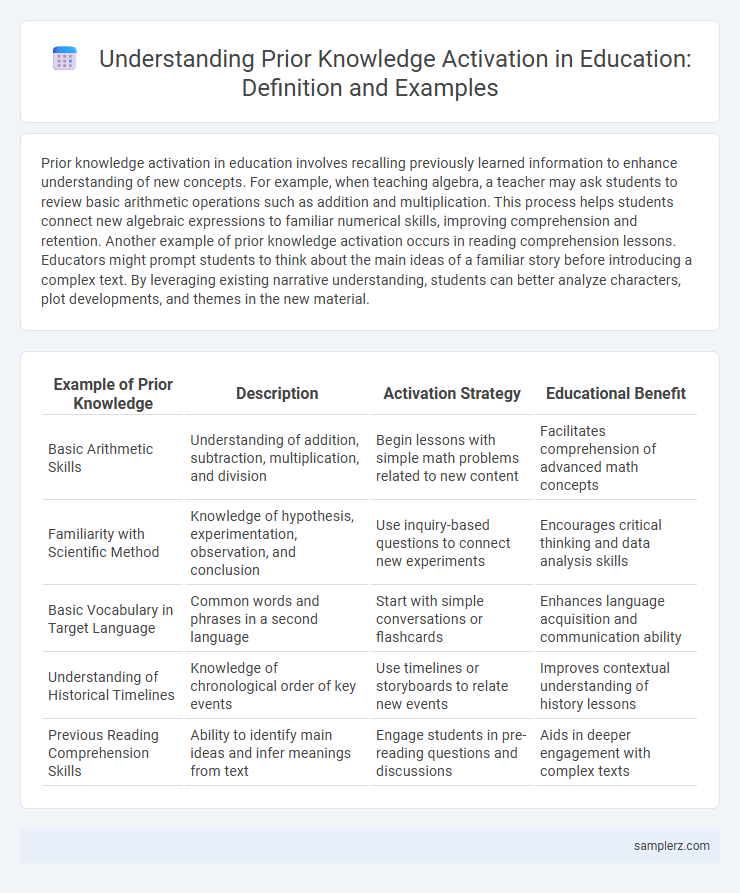Prior knowledge activation in education involves recalling previously learned information to enhance understanding of new concepts. For example, when teaching algebra, a teacher may ask students to review basic arithmetic operations such as addition and multiplication. This process helps students connect new algebraic expressions to familiar numerical skills, improving comprehension and retention. Another example of prior knowledge activation occurs in reading comprehension lessons. Educators might prompt students to think about the main ideas of a familiar story before introducing a complex text. By leveraging existing narrative understanding, students can better analyze characters, plot developments, and themes in the new material.
Table of Comparison
| Example of Prior Knowledge | Description | Activation Strategy | Educational Benefit |
|---|---|---|---|
| Basic Arithmetic Skills | Understanding of addition, subtraction, multiplication, and division | Begin lessons with simple math problems related to new content | Facilitates comprehension of advanced math concepts |
| Familiarity with Scientific Method | Knowledge of hypothesis, experimentation, observation, and conclusion | Use inquiry-based questions to connect new experiments | Encourages critical thinking and data analysis skills |
| Basic Vocabulary in Target Language | Common words and phrases in a second language | Start with simple conversations or flashcards | Enhances language acquisition and communication ability |
| Understanding of Historical Timelines | Knowledge of chronological order of key events | Use timelines or storyboards to relate new events | Improves contextual understanding of history lessons |
| Previous Reading Comprehension Skills | Ability to identify main ideas and infer meanings from text | Engage students in pre-reading questions and discussions | Aids in deeper engagement with complex texts |
Understanding Prior Knowledge in Learning
Understanding prior knowledge in learning involves recognizing how students' existing schemas influence new information processing and retention. For example, activating prior knowledge about basic arithmetic operations helps learners grasp complex mathematical concepts such as algebraic expressions. This cognitive strategy enhances engagement and facilitates deeper comprehension by linking new content to familiar ideas.
The Role of Prior Knowledge in Classroom Instruction
Prior knowledge activates students' cognitive frameworks, enhancing comprehension and retention during new lessons. For example, a history teacher reviewing key events from previous years helps students connect past content to current topics, deepening understanding. This activation of prior knowledge guides focused engagement, improves critical thinking, and facilitates meaningful learning in classroom instruction.
Activating Prior Knowledge: Effective Strategies
Activating prior knowledge involves techniques such as KWL charts, which prompt students to list what they Know, Want to know, and have Learned, thereby engaging existing schema. Other strategies include brainstorming sessions and concept mapping, which help learners connect new information with previously acquired concepts. These methods enhance comprehension and retention by linking fresh content to familiar experiences.
Examples of Prior Knowledge in Mathematics
Recognizing number patterns and understanding basic operations like addition and subtraction serve as essential examples of prior knowledge in mathematics activation. This foundational knowledge enables students to grasp more complex concepts such as algebraic equations and problem-solving strategies. Familiarity with shapes and measurement units further supports cognitive connections, promoting deeper mathematical comprehension.
Utilizing Students’ Background Knowledge in Reading
Utilizing students' background knowledge in reading activates prior knowledge by connecting new texts to familiar concepts, enhancing comprehension and retention. For example, before reading a story about ecosystems, teachers might prompt students to recall their own experiences with nature or discuss common animal habitats. This strategy leverages existing cognitive frameworks, facilitating deeper engagement and critical thinking during reading activities.
Activating Science Concepts Through Prior Experience
Activating prior knowledge in science education involves connecting new concepts to students' existing experiences, such as recalling everyday phenomena like weather patterns or plant growth. For example, before teaching photosynthesis, asking students to share observations about how sunlight affects plants can deepen their understanding. This approach enhances comprehension by bridging familiar knowledge with scientific principles.
Connecting New Content to Students’ Previous Learning
Activating prior knowledge involves linking new educational content to students' existing understanding, such as using familiar historical events when introducing a complex social studies topic. This approach enhances cognitive connections and promotes deeper comprehension by building on foundational concepts already grasped. Studies show students who relate new material to prior knowledge engage more actively and retain information longer.
Assessing and Identifying Prior Knowledge in Learners
Assessing and identifying prior knowledge in learners involves diagnostic tests, concept maps, and KWL charts to gauge existing understanding and misconceptions before instruction. These methods enable educators to tailor lesson plans effectively, addressing gaps and building on relevant experiences. Leveraging prior knowledge activates cognitive schemas, enhancing engagement and retention in educational settings.
The Impact of Prior Knowledge on Academic Achievement
Prior knowledge significantly influences academic achievement by enabling students to connect new information with existing cognitive frameworks, resulting in deeper comprehension and retention. Research shows that learners with strong foundational knowledge in subjects like mathematics or reading outperform peers when engaging with advanced materials. Educators leveraging prior knowledge through targeted instruction and assessments can enhance student focus and improve overall educational outcomes.
Enhancing Engagement by Activating Prior Knowledge
Activating prior knowledge in education involves prompting students to recall relevant information before introducing new concepts, which significantly enhances engagement and comprehension. Techniques such as brainstorming sessions, KWL charts (Know, Want to know, Learned), and concept mapping effectively connect existing knowledge with new content. Research indicates that learners who actively engage prior knowledge demonstrate improved retention and deeper understanding of subject matter.

example of prior knowledge in activation Infographic
 samplerz.com
samplerz.com